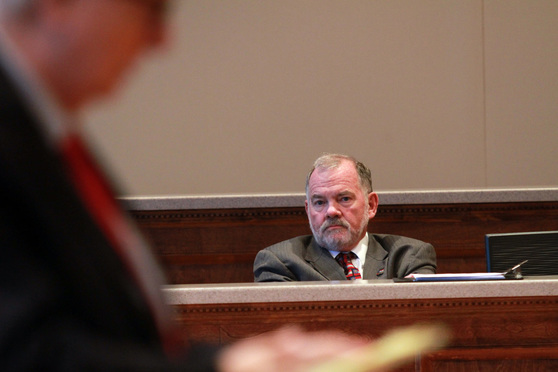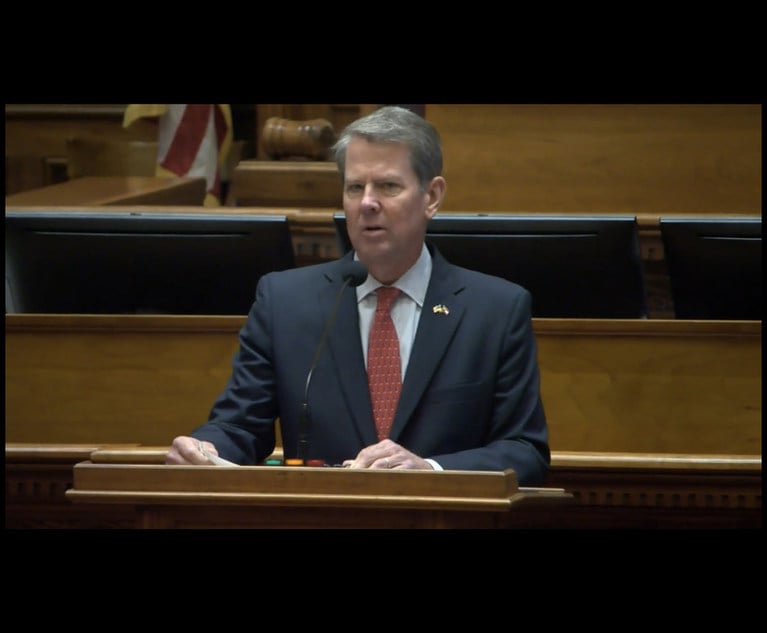Witnesses: Judge's Account Was Overdrawn When He Claimed Registry Funds
A court clerk who was instructed by Superior Court Judge Robert "Mack" Crawford to pay him $15,675.62 that had languished in the court registry for 15 years said it was Crawford's idea, not hers, to give him the money. Crawford's personal bank account was more than $2,000 overdrawn when he deposited the check in his personal account shortly before Christmas 2017.
February 26, 2019 at 04:12 PM
6 minute read
 Judge Mack Crawford, Pike County Superior Court, at his JQC hearing on Monday. (Photo: John Disney/ ALM)
Judge Mack Crawford, Pike County Superior Court, at his JQC hearing on Monday. (Photo: John Disney/ ALM)
The court clerk who gave Superior Court Judge Robert “Mack” Crawford more than $15,000 from the Pike County court registry in 2017 contradicted the judge's testimony Monday in an ethics hearing convened by the state judicial watchdog agency.
Pike County Superior Court Clerk Cynthia Williams testified at Crawford's ethics hearing that for eight years she talked occasionally with Crawford about locating two of his former clients to return $15,675.62 languishing in the court registry. Crawford—who was in private practice until his 2010 appointment to the Griffin Circuit Superior Court bench—deposited the money in the registry in 2002 after securing the funds from clients he represented in a suit to redeem property sold at a county tax foreclosure sale.
But Williams testified that Crawford never mentioned he had any claim to the registry funds until shortly before Christmas in 2017 when she told him she intended to forward the money to the state as unclaimed funds.
Only then did Crawford tell her that his former client Dan Mike Clark had promised him the money for legal fees, Williams testified. Crawford then gave her a handwritten note directing her to pay him the money, along with an instruction not to put the note in the case file, which had closed since 2009, she said.
When Crawford laid claim to the money, his personal bank account was overdrawn by more than $2,000, the judge acknowledged as he was grilled for more than two hours under oath Monday by Ben Easterlin, executive director of the state Judicial Qualifications Commission.
But Crawford insisted that, despite the overdraft, he had money to cover it in other accounts at First Bank of Pike in Zebulon where he said he and his family have done business for years.
Williams was one of several witnesses who testified Monday at the hearing over whether Crawford violated the state Code of Judicial Conduct when he directed Williams to pay him the unclaimed money and then deposited it in his personal bank account and spent it.
Crawford repaid the money several months later, after the Judicial Qualifications Commission received multiple ethics complaints and opened an investigation. The JQC filed ethics charges against Crawford last summer, which could, if verified, lead to his removal from the bench.
The JQC suspended the judge with pay in December after a Pike County grand jury indicted him on two felony charges—theft and violating his oath of office—that mirror the alleged ethics violations. Monday's hearing will resume March 22 when Crawford attorneys, former Georgia Gov. Roy Barnes of Marietta's The Barnes Law Group and Zebulon attorney Virgil Brown, will present their defense of the judge. Easterlin rested his presentation late Monday.
'Don't Know Why I Didn't'
Williams said that she believed Crawford's clients were entitled to the money after Griffin Circuit Superior Court Judge Tommy Hankinson closed the dormant case in 2009 and ordered the money returned to Clark and co-plaintiff Bobbie Whalen. By then, Clark had died and Whalen had left the state.
Williams testified that it was Crawford's idea, not hers, to pay him the unclaimed funds. Crawford testified earlier Monday that paying him the money was “an idea that the two of us agreed to” and that Williams, at one point, “asked me if I wanted to take the money.”
The judge's subsequent note directing Williams to pay him also included instructions that it “cannot be filed in the case because [the] case has been closed for eight years,” she testified. The note included an addendum: “This note should be placed in the file but not recorded.”
Williams said she didn't view Crawford's note as a court order. “It's just what it is. A note,” she said. But she testified that she would not have given Crawford a check without it.
During his testimony before Williams took the stand, Crawford said he promised the clerk that, if she made the check out to him, he would be responsible for returning it to Clark's heirs.
Fulton County Superior Court Chief Judge Robert McBurney—one of three JQC members presiding over the ethics hearing—asked Williams if she believed she could have turned Crawford down when he asked for the money.
“I could have said no,” Williams replied. “I don't know why I didn't. Looking back on it, I should have. At the time, I don't think I was thinking very clearly at all.”
Williams wasn't the only witness whose testimony at times diverged from Crawford's. John Barker, president and CEO of the First Bank of Pike said that, when Crawford's personal bank account was overdrawn in December 2017, the bank had no policy in place that would have allowed it to automatically transfer funds from Crawford's other accounts, or those in his wife's or son's name, without specific instructions from the account holders.
Crawford had testified that he didn't even think his account was overdrawn when he deposited the check from the court registry, adding that, “I don't remember.” Bank records entered into evidence at the hearing showed that Crawford's personal account was overdrawn by $2,232 on Dec. 14, 2017—one day before he deposited the check—and had been overdrawn for several days.
Crawford also contended the bank “always covered it” if his account was overdrawn, “because there are a lot of other accounts with my name on it. … It wasn't written, but there was just an understanding they would move money.”
Barker acknowledged that the bank, at times, would pay checks from a customer's account, even though it held insufficient funds and bill the account holder overdraft fees. “We do it informally and on an ad-hoc basis,” he said.
In December 2017, he said Crawford's account was billed $315 in overdraft fees before he deposited the $15,675.62 check. “We paid the checks and kept going,” he said. “We didn't worry about it. It's how we did it with our other customers.”
But he said the bank had no informal agreement with Crawford to move money among his family's accounts to cover any overdraft. That would be “illegal,” he said.
This content has been archived. It is available through our partners, LexisNexis® and Bloomberg Law.
To view this content, please continue to their sites.
Not a Lexis Subscriber?
Subscribe Now
Not a Bloomberg Law Subscriber?
Subscribe Now
NOT FOR REPRINT
© 2025 ALM Global, LLC, All Rights Reserved. Request academic re-use from www.copyright.com. All other uses, submit a request to [email protected]. For more information visit Asset & Logo Licensing.
You Might Like
View All
Panel to Decide if Governor Should Suspend Georgia Lawyer From Elected Post
4 minute read

Plaintiffs Attorneys Awarded $113K on $1 Judgment in Noise Ordinance Dispute
4 minute readTrending Stories
- 1Fresh lawsuit hits Oregon city at the heart of Supreme Court ruling on homeless encampments
- 2Ex-Kline & Specter Associate Drops Lawsuit Against the Firm
- 3Am Law 100 Lateral Partner Hiring Rose in 2024: Report
- 4The Importance of Federal Rule of Evidence 502 and Its Impact on Privilege
- 5What’s at Stake in Supreme Court Case Over Religious Charter School?
Who Got The Work
J. Brugh Lower of Gibbons has entered an appearance for industrial equipment supplier Devco Corporation in a pending trademark infringement lawsuit. The suit, accusing the defendant of selling knock-off Graco products, was filed Dec. 18 in New Jersey District Court by Rivkin Radler on behalf of Graco Inc. and Graco Minnesota. The case, assigned to U.S. District Judge Zahid N. Quraishi, is 3:24-cv-11294, Graco Inc. et al v. Devco Corporation.
Who Got The Work
Rebecca Maller-Stein and Kent A. Yalowitz of Arnold & Porter Kaye Scholer have entered their appearances for Hanaco Venture Capital and its executives, Lior Prosor and David Frankel, in a pending securities lawsuit. The action, filed on Dec. 24 in New York Southern District Court by Zell, Aron & Co. on behalf of Goldeneye Advisors, accuses the defendants of negligently and fraudulently managing the plaintiff's $1 million investment. The case, assigned to U.S. District Judge Vernon S. Broderick, is 1:24-cv-09918, Goldeneye Advisors, LLC v. Hanaco Venture Capital, Ltd. et al.
Who Got The Work
Attorneys from A&O Shearman has stepped in as defense counsel for Toronto-Dominion Bank and other defendants in a pending securities class action. The suit, filed Dec. 11 in New York Southern District Court by Bleichmar Fonti & Auld, accuses the defendants of concealing the bank's 'pervasive' deficiencies in regards to its compliance with the Bank Secrecy Act and the quality of its anti-money laundering controls. The case, assigned to U.S. District Judge Arun Subramanian, is 1:24-cv-09445, Gonzalez v. The Toronto-Dominion Bank et al.
Who Got The Work
Crown Castle International, a Pennsylvania company providing shared communications infrastructure, has turned to Luke D. Wolf of Gordon Rees Scully Mansukhani to fend off a pending breach-of-contract lawsuit. The court action, filed Nov. 25 in Michigan Eastern District Court by Hooper Hathaway PC on behalf of The Town Residences LLC, accuses Crown Castle of failing to transfer approximately $30,000 in utility payments from T-Mobile in breach of a roof-top lease and assignment agreement. The case, assigned to U.S. District Judge Susan K. Declercq, is 2:24-cv-13131, The Town Residences LLC v. T-Mobile US, Inc. et al.
Who Got The Work
Wilfred P. Coronato and Daniel M. Schwartz of McCarter & English have stepped in as defense counsel to Electrolux Home Products Inc. in a pending product liability lawsuit. The court action, filed Nov. 26 in New York Eastern District Court by Poulos Lopiccolo PC and Nagel Rice LLP on behalf of David Stern, alleges that the defendant's refrigerators’ drawers and shelving repeatedly break and fall apart within months after purchase. The case, assigned to U.S. District Judge Joan M. Azrack, is 2:24-cv-08204, Stern v. Electrolux Home Products, Inc.
Featured Firms
Law Offices of Gary Martin Hays & Associates, P.C.
(470) 294-1674
Law Offices of Mark E. Salomone
(857) 444-6468
Smith & Hassler
(713) 739-1250







